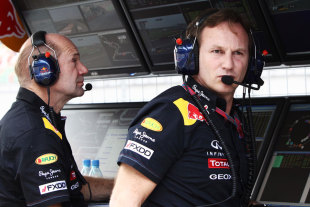- Red Bul news
Red Bull still committed to cost cutting - Horner

Red Bull boss Christian Horner believes his team can still work towards controlling costs in Formula One despite withdrawing from the Formula One Teams' Association (FOTA).
Red Bull, Ferrari and Sauber have all pulled out of FOTA in the last two weeks amid a disagreement over how teams' spending should be contained. After speculation that teams, including Red Bull, were finding a way to work outside the existing Resource Restriction Agreement (RRA), FOTA reached a stalemate over the issue and the three teams resigned.
All three will serve a two-month notice period and Horner said he would continue to work with FOTA to try to reach an agreement on cost-cutting measures.
"It is a two-month notice period that both Ferrari and ourselves will serve and I think Sauber have joined that now," he said on Saturday. "We have a meeting with some of the other FOTA members on Monday to talk about cost control, but we'll see. Nothing is ever totally set in stone, but for the time being we feel that it is the right decision to take to step out of FOTA."
Asked if he thought Red Bull's decision to leave would move things forward, Horner said: "I think for sure it has stimulated discussion and hopefully something positive will come out of it, but we only withdrew last week so we'll see. The team remains committed to trying to find ways of containing costs, but in a transparent manner. We're a subsidiary of an energy drinks company and what we do is only relevant to Formula One and therefore it's crucial that whatever regulations or [cost cutting] format is agreed upon is transparent and workable."
Horner also outlined his gripes with the RRA, saying he was concerned that manufacturer teams, such as Ferrari and Mercedes, could find loopholes in the agreement through their size and engine departments.
"It needs to encompass all aspects of the car," he said. "Dealing with equivalence is always quite difficult and quite dangerous. Each of the teams has a different make up, different ownership - some belong to automotive manufacturers and some are independent. If you look at the things that work, like the testing, like the windtunnel hours, like the restriction in personnel, the things that you can touch and feel seem to work quite well. But as soon as you start trading equivalence of hours versus external spend, that's where it seems to run into some difficulty.
"There's a willingness from all of the teams to try and contain costs, it's just the manner that you do that. And of course you can't exclude the engine from that as well - with some teams producing their own engines - so it's therefore important to look at the teams as a whole rather than cherry-picking chassis opposed to engine."
Red Bull technical director Adrian Newey said transparency between the teams was necessary for any kind of cost-cutting agreement to work.
"We all agree with budget control, we don't want to get into the arms race that happened with the manufacturers a few years ago, and certainly with Red Bull we wouldn't be able to," he said. "But if we can concentrate on the things that are tangible - the windtunnel and CFD restriction works very well because you can measure it and testing restrictions are exactly the same.
"But with some of the teams being involved in the subsidiaries of major automotive companies, it becomes a bit difficult to know exactly how their resources are really split. It's about having things that you can genuinely measure and as soon as you can't have that you get all the sniping and the bitching and accusations."

